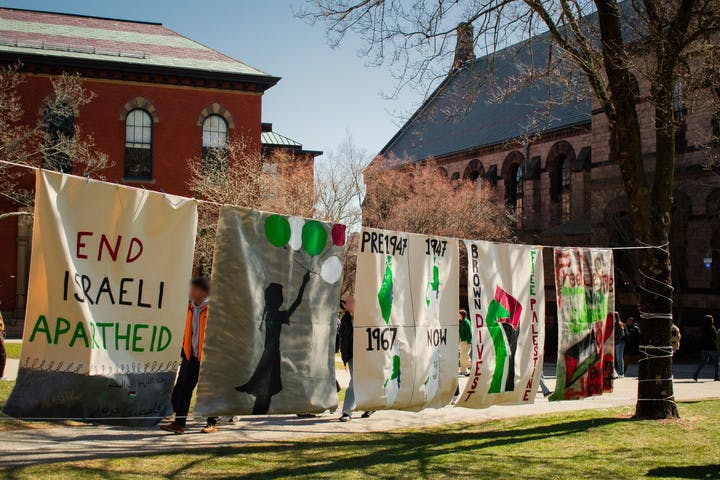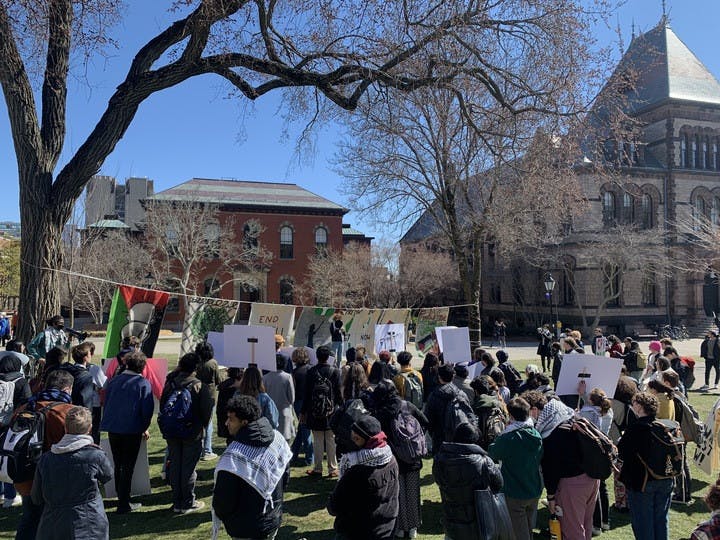Brown University Students for Justice in Palestine organizers and roughly 75 community members rallied on the Main Green Monday afternoon, standing in front of a wall of hand-painted banners to protest the actions of the Israeli government and demand that “the University divests from companies profiting from human rights abuses in Palestine,” according to an SJP press release.
After a series of speeches from rally organizers and call-and-response chants, the protestors marched to University Hall. Three SJP members delivered letters addressed to President Christina Paxson P’19 P’MD’20 and other University administrators, encouraging them to support divestment.
“This installation represents what’s officially called the West Bank barrier,” SJP organizer Eli Grossman ’24 said during his speech, referencing the string of protest banners. “Constructing a wall like this is a time-honored protest tactic for Students for Justice in Palestine.” The protests are part of a “week of solidarity and consciousness-raising” titled “Israeli Apartheid Week,” Grossman said.
In the past two years, Amnesty International and Human Rights Watch have both published reports alleging that the Israeli government’s treatment of Palestinians amounts to “apartheid.” A March 2022 United Nations Special Rapporteur’s report reached the same conclusion.
Rally attendees voiced support for SJP’s “Divest and Democratize” campaign, which calls for the University to withdraw its investments from companies that are “profiting from Israeli apartheid and (are) complicit in human rights abuses against Palestinians,” according to a campaign flier.
SJP and the Graduate Labor Organization gathered at the Faculty Club in February to distribute fliers and share the campaign’s message with members of the Corporation, the University’s highest governing body, during their February meeting.

Photo Courtesy of Maxime Pitchon
At Monday’s rally, a Palestinian undergraduate student shared statements on behalf of Palestinian undergraduate and graduate students.
“We are sick and tired of having to prove our humanity,” the student said. “We are sick and tired of having to wake up every day and prove that we are human beings, that we deserve a future.”
“The University will claim that they have a board of Palestinian studies, that they care about Palestinian voices,” the student added. “But they will … profit off of the occupation … that brought us here in the first place.”
Brian Clark, a spokesperson for the University, did not immediately respond to a request for comment.
Following SJP and GLO’s rally in February, Clark wrote in an email to The Herald that “Brown is a learning community strengthened by expression of the wide range of views held by individuals and groups on campus.”
“Each of us as members is free to debate and protest while respecting the freedom of others to disagree,” Clark wrote.
In March 2020, the University’s now-defunct Advisory Committee on Corporate Responsibility in Investment Policies released a report recommending that the University divest from “any company that profits from the Israeli occupation of Palestinian land.”
Paxson did not publicly address the report until she shared a March 2021 letter with ACCRIP’s successor body, the Advisory Committee on University Resources Management. In the letter, Paxson wrote that ACCRIP’s report lacked rigorous research and specificity, prompting her to not bring the matter to the Corporation for consideration.
“Brown is deeply committed to academic freedom, and we will continue to uphold the right of members of the Brown community to express their views on the Israeli-Palestinian conflict,” Paxson wrote in 2021. “We will not use the endowment to take an institutional position on this issue.”

In their speeches, SJP organizers emphasized undergraduate support for divestment, citing a 2019 referendum conducted by the Undergraduate Council of Students. In the election, with roughly 44% turnout, around 69% of students supported divestment and increased transparency surrounding the University’s investments, The Herald previously reported.
In response to the referendum, Paxson wrote in a letter that the University was not obligated to act on the student vote and that the endowment is “not a political instrument to be used to express views on complex social and political issues, especially those over which thoughtful and intelligent people vehemently disagree.”
Speakers at the rally also criticized Paxson’s speech at the Hillel International Israel Summit East last month, during which she reiterated the University’s decision not to take a formal stance on issues related to Israel-Palestine and restated that she would not heed “calls to use our endowment as a tool for political advocacy.”
“I am here (and) involved with SJP because I know that the endowment is a political instrument,” SJP organizer Ariela Rosenzweig ’24 told The Herald after the rally.
Amr Ghazi ’26, who is Palestinian, said he came late to the rally and was surprised to see many non-Palestinian people supporting SJP’s demands. “To have a community that's not even majority Arab do something like this means a lot to me.”
Editors' Note: This story has been updated with changes to names associated with quotations.

Sam Levine is a University News editor from Brooklyn, New York covering on-campus activism. He is a senior concentrating in International and Public Affairs.





